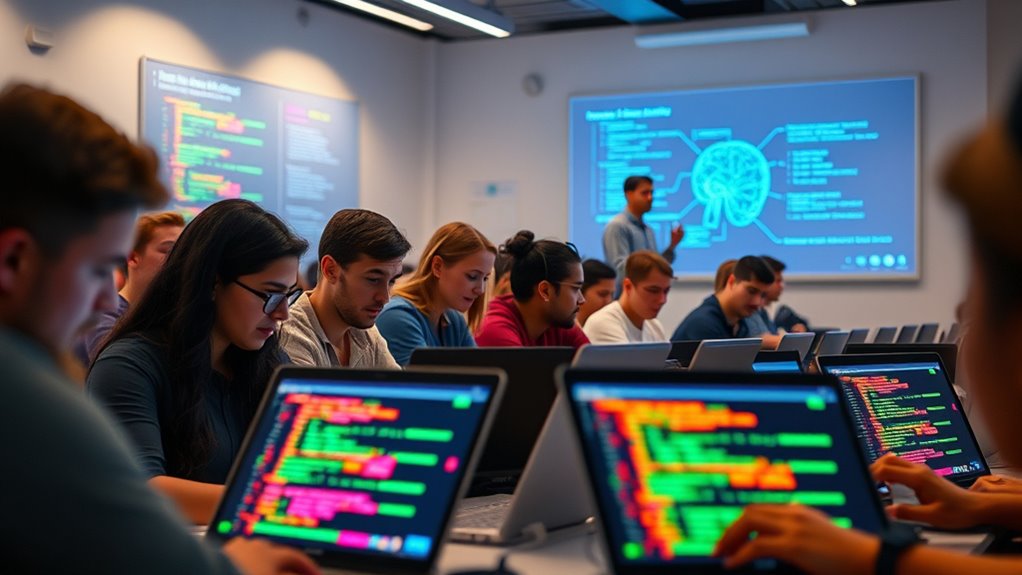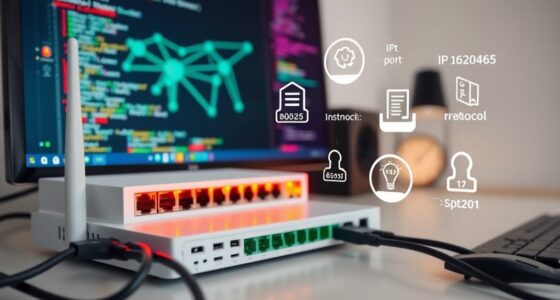AI in coding bootcamps can make your learning experience more personalized and engaging. It helps tailor content to your progress, offers quick feedback, and even assesses your skills fairly. Industry partnerships bring real-world projects, boosting your confidence. But be aware, ethical use and data privacy are essential, and cybersecurity measures protect everyone’s information. To discover how these innovations shape your future in tech, keep exploring these exciting developments.
Key Takeaways
- AI enhances personalized learning, helping beginners adapt to their individual pace and style.
- Ethical AI use in bootcamps ensures responsible, fair, and transparent educational practices.
- Industry partnerships integrate real-world projects, giving beginners practical AI experience.
- AI-powered tools support student well-being by reducing stress and increasing engagement.
- Cybersecurity measures are vital to protect sensitive data in AI-integrated coding programs.

Have you ever wondered how artificial intelligence is transforming coding bootcamps? As you explore this rapidly evolving landscape, you’ll notice that AI isn’t just a tool for learning; it’s reshaping the entire approach to education and industry collaboration. One key aspect to reflect on is the ethical considerations that come with integrating AI into training programs. Developers and educators are becoming increasingly aware of the importance of responsible AI use, especially in an environment where students rely heavily on these tools to learn programming skills. Guaranteeing transparency, fairness, and privacy is essential to maintain trust and avoid biases that could unfairly influence a student’s progress. For example, AI-driven assessments need to be designed carefully to prevent unintended discrimination, and students should be educated about how AI models make decisions. This awareness helps foster a learning environment rooted in integrity and respect for individual rights. Additionally, cybersecurity vulnerabilities during large-scale AI deployment in educational settings highlight the need for cybersecurity measures to protect student and institutional data. Implementing robust security protocols is especially critical given the sensitive nature of student information and the potential risks associated with data breaches. Furthermore, the integration of health benefits from AI-powered tools can support student well-being by providing personalized learning experiences and reducing stress associated with traditional assessment methods.
At the same time, industry partnerships are playing a vital role in shaping the future of AI in coding bootcamps. Many bootcamps now collaborate directly with tech companies to create curriculum content, provide real-world projects, and offer mentorship opportunities. These partnerships benefit both students and industry players: students gain access to up-to-date tools and practical experience, while companies can help shape a skilled workforce tailored to their needs. When industry leaders participate in curriculum development, they ensure that the training aligns with the latest industry standards and technological advancements. This synergy accelerates students’ readiness for employment and helps close the skills gap that many tech companies face.
You might also notice that these partnerships foster innovation. Companies bring in cutting-edge AI tools and platforms that students can experiment with, giving you hands-on experience that’s directly applicable to real-world jobs. This direct exposure helps you grasp complex concepts faster and builds confidence as you see how AI operates in professional environments. However, it’s important to remain critical and aware of how industry influences may shape the curriculum—striking a balance between educational independence and industry input is key. As you progress, understanding the ethical considerations behind AI deployment and the role of industry partnerships will help you become a more conscientious developer. You’ll be better equipped not only with technical skills but also with the awareness needed to navigate the ethical landscape of AI applications. Ultimately, AI’s integration into coding bootcamps offers exciting opportunities, but it also calls for thoughtful engagement to guarantee that the benefits are shared responsibly and equity in education.
Frequently Asked Questions
How Does AI Personalize Learning Experiences in Bootcamps?
AI personalizes your learning experience by offering adaptive learning, which adjusts the curriculum based on your progress and understanding. It identifies areas where you struggle and provides personalized feedback to help you improve. This tailored approach keeps you engaged, guarantees efficient learning, and helps you master skills faster. With AI, your bootcamp experience becomes more focused, supporting your unique learning pace and style every step of the way.
Can AI Replace Human Instructors in Coding Education?
Think of AI as a lightning bolt lighting the path, but not the guiding hand itself. While AI can handle automated grading and offer instructor support, it can’t replace the human touch that inspires, motivates, and understands nuanced student needs. You need human instructors to create a learning atmosphere, adapt to emotions, and foster critical thinking—qualities that go beyond algorithms and data. AI complements, but doesn’t replace, human mentorship.
What Are the Privacy Concerns With AI Tools in Bootcamps?
When considering AI tools in bootcamps, privacy concerns focus on data security and bias mitigation. You need to guarantee your personal data is protected from breaches, which requires strong security measures. Additionally, be aware of potential bias in AI algorithms that could influence your learning experience unfairly. By addressing these issues, you help create a safer, more equitable environment for everyone involved.
How Accessible Are Ai-Powered Coding Resources for Beginners?
You might think AI-powered coding resources are totally accessible for beginners, but don’t be fooled. Accessibility barriers like complex interfaces and limited language options can make learning harder than it needs to be. Ironically, these tools often promise to democratize coding, yet language limitations and technical hurdles still block many from fully benefiting. So, while they’re available, true accessibility remains a work in progress for newcomers.
Will Ai-Driven Assessments Affect My Bootcamp Graduation Chances?
AI-driven assessments might influence your bootcamp graduation chances, but it’s crucial to account for AI ethics and assessment bias. These tools can sometimes misjudge your skills due to biased algorithms or flawed evaluation methods. To succeed, stay transparent about your progress, seek feedback, and understand how AI evaluates your work. Being proactive helps you navigate potential biases and ensures your efforts are accurately recognized, boosting your chances of graduation.
Conclusion
Embracing AI in coding bootcamps can transform your learning journey, making concepts clearer, practices smarter, and problems easier to solve. It’s about enhancing your skills, expanding your understanding, and accelerating your progress. By integrating AI, you’re not just learning to code—you’re learning to innovate, adapt, and thrive in a tech-driven world. So, stay curious, stay proactive, and let AI be your tool for growth, success, and endless possibilities.









